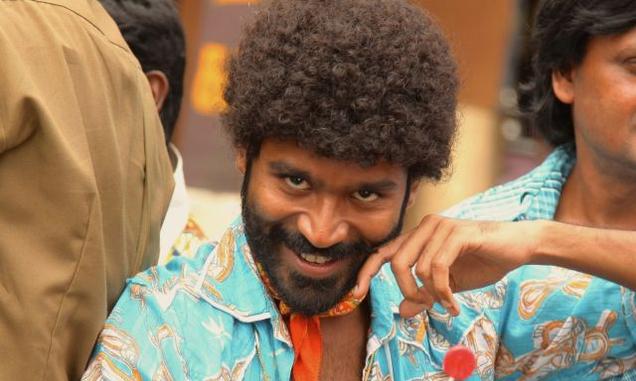Who could have believed that three average love stories would assume bigger proportions and become a lot more novel by the simple technique of connecting them all with a concept — in this case, past life regression and rebirth? The answer: K. V. Anand. A concept, not unlike the one employed in Dead Again (1991), is used here, and Anegan both complicates and simplifies it. It adds fight sequences, it adds song-and-dance routines, it adds punchlines (“Azhagaana ponnungala paathale problem dhaan; aanaa unna pakkalaam”), it adds a few twists, and then, it adds more fight sequences.
It simplifies the concept by not really caring for too much depth. Say, if a woman could somehow see and remember details of her previous lives (assuming there were previous lives, of course), how complicated would her existence be? If our minds sometimes seen incapable of handling the burden of this life’s existence, just take a moment to imagine how insufferably burdensome it would be to remember minute details of several other lives you have lived. Also, has she been accidentally burdened with this super-memory only in this birth? Anegan doesn’t bother itself with such deep analysis and is happy to keep moving at a brisk pace — like, say, Ko, another K. V. Anand film whose subject, again, could have made for a more serious film. So, even while you’re impressed with the novelty of the film’s idea, you are saddened when you realise you won’t get the intricacy the idea deserves. Anegan, in that sense, is a curious film, because if it had been handled with more storytelling sincerity, if the makers had taken their minds off the box office, they could really have had a gem here — a gem that ironically, of course, may not make the sort of money that the film, in its present form, will most definitely end up making. A great film, after all, doesn’t always make great money. Ask the makers of Anbe Sivam.
Dhanush is clearly in his glory days. It seems he can do anything and be applauded for it — even hold a woman (Amyra Dastur) up, from atop a giant wheel, with a single hand… with his single hand. He comes in a total of four looks, and aces almost all of them. The only look you’re not really sure about is the one as a warrior-king in the song ‘Roja Kadale’. But that’s just for five minutes. Anegan also has a plum role for Amyra, complete with various get-ups. She looks every bit her part; there’s only the minor criticism that seems to apply to almost every non-Tamil speaking heroine these days: lip-syncing. Over to the main surprise: veteran actor Karthik, who comes back with all the charm that you were once used to associating with him. In fact, even Dhanush can’t resist mimicking Karthik’s dialogue delivery in one scene that beautifully plays to the gallery.
Anegan has its share of problems too. In one scene, you’re shown how an event repeats itself, and how poetic its repetition is. To run home this point, you’re shown a brief glimpse of the first time it occurred. Oh, stop! We get it! No need to dumb it down. In another scene, there’s a needless joke on a homosexual who has no personal boundaries. It looks like that’s becoming some sort of a trend. The whole love angle, set in the present, between Ashwin (Dhanush) and Madhu (Amyra) is also problematic at its core. You’re provided with quite a lot of evidence to believe that Madhu is a bit off, a bit batty. For instance, she sports a pleasant reminiscing smile after just revisiting a horrific murder. She drives her car without any heed to the public, missing two or three civilians by the strand of a hair. She even pelts the man she loves with large stones. Ouch! And like us, Ashwin isn’t entirely sure of her sanity. But this doesn’t stop him from professing his love to her. To quote an urban dictionary phrase, “Dude, that’s just wrong!”
The dialogues seem generally well thought-out. When Dhanush gets arrested at his girlfriend’s house, he makes a wry comment about the irony of him telling his mom that he was leaving to his ‘maamiyaar veedu.’ There’s also a cute reference to ‘Mersalayitten’ that leaves the audience cheering. As for cheering, take your earmuffs to the theatre, for, you won’t believe the explosion of noise when ‘Danga Maari’, the superhit song of the film, begins playing. People confuse the theatre with a discotheque (at least did, when I watched it in Devi). Also admirable is the nonchalance with which Karthik delivers English lines throughout the film. It doesn’t seem to matter that a section of the audience may not get all his lines. The temptation to go the Major Sundararajan way (repeating English lines in Tamil) is impressively resisted, even as he mouths line after line, dipped in American accent.
Anegan, on the whole, is a complex story told simplistically. Had the complexity been retained, and had the masala spoon been of a lesser size, it would have made for a great film. For now though, it will have to satisfy itself with being a hit film.

